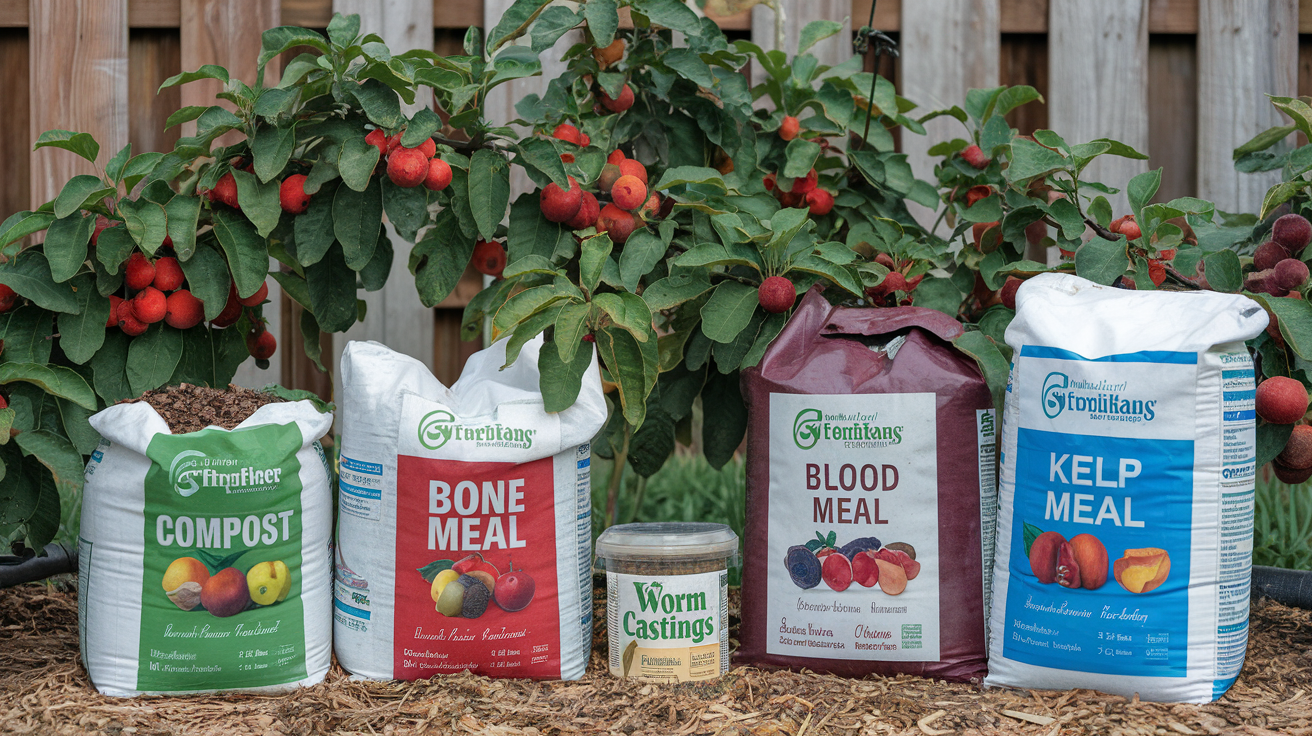When it comes to growing healthy and productive fruit plants, the right fertilizer can make all the difference. As an experienced gardener, I, Rhys Garden, have experimented with various fertilizers to discover what truly works best for different types of fruit plants. In this guide, Rhys Garden will share my insights on the top fertilizers that can help you achieve bountiful harvests, ensuring your fruit plants get the nutrients they need to thrive.
Understanding the Nutritional Needs of Fruit Plants
Before we delve into the best fertilizers, it’s essential to understand what our fruity friends crave. Just like us, fruit plants have specific dietary requirements to grow strong and produce delicious fruits.
The NPK Ratio: The Holy Trinity of Plant Nutrition
When you’re browsing the garden center aisles, you’ll often see numbers like 5-10-5 or 10-10-10 on fertilizer bags. These numbers represent the NPK ratio:
- N (Nitrogen): Promotes leafy growth and overall plant health
- P (Phosphorus): Encourages root development and flower formation
- K (Potassium): Enhances fruit quality and disease resistance
For fruit plants, a balanced NPK ratio is typically recommended, with slightly higher phosphorus and potassium levels to support fruit development.
Micronutrients: The Unsung Heroes
While NPK gets all the glory, micronutrients play a crucial role in fruit plant health:
- Iron: Essential for chlorophyll production
- Magnesium: Aids in photosynthesis
- Calcium: Strengthens cell walls, preventing disorders like blossom end rot
- Boron: Helps with flower and fruit development
A study by the University of California, Davis, found that adequate micronutrient levels can increase fruit yield by up to 20% in some species.
Types of Fertilizers for Fruit Plants

Now that we understand what our fruit plants need, let’s explore the different types of fertilizers available:
Organic Fertilizers: Nature’s Goodness
Organic fertilizers are derived from natural sources and offer slow-release nutrients that improve soil structure over time.
Compost: The Garden’s Black Gold
Compost is a nutrient-rich organic material that can work wonders for your fruit plants. It’s packed with beneficial microorganisms that enhance soil health and plant resilience.
Pro Tip: Create your own compost bin to recycle kitchen scraps and yard waste. It’s eco-friendly and budget-friendly!
Animal Manure: A Time-Tested Solution
Well-aged manure from herbivores like cows, horses, or chickens can provide a balanced nutrient profile for fruit plants. However, be cautious with fresh manure, as it can burn plant roots.
Safety First: Always use composted manure to avoid potential pathogens.
Fish Emulsion: The Ocean’s Bounty
Fish emulsion is a liquid fertilizer rich in nitrogen and trace minerals. It’s particularly beneficial for leafy growth and overall plant vigor.
Gardener’s Note: While effective, fish emulsion can have a strong odor. Consider applying it on a day when you’re not planning outdoor activities!
Synthetic Fertilizers: Quick and Precise
Synthetic fertilizers offer fast-acting nutrients in precise ratios, allowing for targeted feeding of fruit plants.
Balanced Granular Fertilizers
Look for granular fertilizers with NPK ratios like 10-10-10 or 5-10-10 for general fruit plant care. These slow-release formulations provide steady nutrition throughout the growing season.
Water-Soluble Fertilizers
These quick-acting fertilizers are perfect for giving your fruit plants a boost during critical growth stages. They’re easily absorbed through leaves and roots.
Application Tip: Use water-soluble fertilizers as a foliar spray early in the morning or late in the evening to prevent leaf burn.
The Best Fertilizer Choices for Popular Fruit Plants
Different fruit plants have varying nutritional needs. Let’s explore some tailored recommendations:
Citrus Trees: Zesty Nutrition
Citrus trees thrive with a slightly higher nitrogen content. Look for fertilizers with an NPK ratio of 2-1-1 or 3-1-1.
Rhys Garden Recommends: Our “Citrus Boost” organic fertilizer blend, specially formulated for citrus trees.
Berry Bushes: Small Fruits, Big Needs
Berries benefit from a balanced fertilizer with added phosphorus and potassium. An NPK ratio of 5-10-5 is ideal.
Fun Fact: Blueberries prefer acidic soil. Consider using an azalea or rhododendron fertilizer for these blue beauties.
Stone Fruits: Peachy Keen Feeding
Peaches, plums, and cherries do well with a balanced fertilizer (10-10-10) in early spring, followed by a higher phosphorus and potassium blend (5-10-10) as fruits develop.
Apple and Pear Trees: Core Nutrition
These pome fruits benefit from a balanced fertilizer in spring, with a shift to higher potassium as fruits ripen. Start with 10-10-10 and transition to 5-5-10.
Fertilizer Application: Timing is Everything
Knowing when to fertilize is just as important as choosing the right product. Here’s a general guide:
- Early Spring: Apply a balanced fertilizer as new growth begins
- Late Spring: Provide a second application, focusing on phosphorus and potassium
- Early Summer: Give a light feeding if needed, especially for heavy bearers
- Late Summer/Fall: Avoid nitrogen-rich fertilizers to prevent late growth vulnerable to winter damage
Remember: Always follow the specific instructions for your fruit plants and local climate conditions.
Organic vs. Synthetic: The Great Debate
The choice between organic and synthetic fertilizers often boils down to personal preference and gardening philosophy. Let’s weigh the pros and cons:
Organic Fertilizers
Pros:
- Improve soil structure and microbial activity
- Release nutrients slowly, reducing the risk of over-fertilization
- Environmentally friendly and sustainable
Cons:
- Slower to show results
- Nutrient content can be variable
- May be more expensive initially
Synthetic Fertilizers
Pros:
- Precise nutrient ratios
- Fast-acting and readily available to plants
- Often more cost-effective
Cons:
- Can lead to nutrient runoff and environmental issues if overused
- May not improve soil structure
- Potential for root burn if overapplied
DIY Fertilizer Solutions: Homegrown Goodness
For the adventurous gardener, creating your own fertilizer can be a rewarding experience. Here are some DIY options:
Compost Tea: Liquid Gold for Your Garden
Steep finished compost in water to create a nutrient-rich “tea” for your fruit plants. This gentle, natural fertilizer is perfect for foliar feeding.
Banana Peel Fertilizer: Going Bananas for Potassium
Save your banana peels! Rich in potassium, they can be chopped and buried near fruit plants or blended into a liquid fertilizer.
Eggshell Calcium Boost
Crushed eggshells provide a slow-release source of calcium, perfect for preventing blossom end rot in tomatoes and peppers.
Common Fertilizer Mistakes to Avoid
Even the most well-intentioned gardeners can make fertilizer faux pas. Here are some pitfalls to watch out for:
- Over-fertilization: More is not always better. Excess nutrients can harm plants and pollute waterways.
- Improper timing: Fertilizing at the wrong time can lead to weak growth or winter damage.
- Ignoring soil pH: Some nutrients become unavailable if the soil pH is off. Test and adjust pH before fertilizing.
- Neglecting micronutrients: Don’t forget about those trace elements that play crucial roles in plant health.
- Inconsistent application: Sporadic feeding can stress plants. Stick to a consistent schedule.
Sustainable Fertilizer Practices: Nurturing Your Garden and the Planet
As responsible gardeners, it’s our duty to consider the environmental impact of our practices. Here are some sustainable approaches to fertilizing fruit plants:
Cover Cropping: Nature’s Fertilizer Factory
Plant nitrogen-fixing cover crops like clover or vetch between fruit trees or in rotation with annual fruits. These plants add nutrients to the soil naturally.
Mulching: Feed the Soil, Feed the Plant
Apply organic mulches around fruit plants. As they break down, they release nutrients and improve soil structure.
Companion Planting: Symbiotic Nutrition
Certain plant combinations can enhance nutrient availability. For example, planting comfrey near fruit trees provides a natural source of potassium as its leaves decompose.
Frequently Asked Questions
Let’s address some common queries about fertilizing fruit plants:
Q: How often should I fertilize my fruit plants?
A: Generally, fruit plants benefit from fertilization 2-3 times per year. However, this can vary depending on the specific plant and soil conditions. Always follow the recommendations for your particular fruit species and local climate.
Q: Can I use coffee grounds as fertilizer for fruit plants?
A: Yes, coffee grounds can be a good source of nitrogen for fruit plants. They also help improve soil structure. However, use them in moderation as part of a balanced fertilizer regimen, as they can increase soil acidity.
Q: Is it better to use granular or liquid fertilizers for fruit plants?
A: Both have their advantages. Granular fertilizers provide slow-release nutrition, while liquid fertilizers offer quick nutrient uptake. For best results, consider using a combination of both throughout the growing season.
Q: How can I tell if my fruit plants are nutrient deficient?
A: Look for signs such as yellowing leaves (nitrogen deficiency), purple-tinged leaves (phosphorus deficiency), or brown leaf edges (potassium deficiency). Soil tests and plant tissue analysis can provide more accurate diagnoses.
Q: Can I use human urine as a fertilizer for fruit plants?
A: While human urine is rich in nitrogen and other nutrients, it’s not recommended for fruit plants due to potential pathogen risks and social taboos. Stick to conventional organic or synthetic fertilizers for safety and peace of mind.
Conclusion
Choosing the best fertilizer for your fruit plants is essential to their growth and the quality of the fruits they produce. By selecting a fertilizer tailored to the specific needs of your plants, you can significantly enhance their health and productivity. With the right care and the proper nutrients, your garden can yield delicious, home-grown fruits that will be the pride of your harvest.

Related Posts
The Ultimate Guide to Fertilizing For Maple Trees
Unlock the Power of Organic Spent Mushroom Compost
What Fertilizer Is Highest In Nitrogen? Boosting Your Garden’s Green Growth